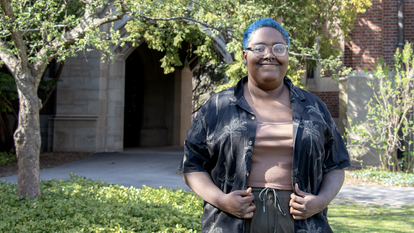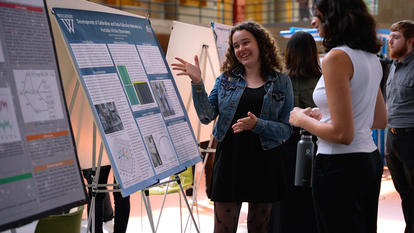Wellesley Economics Professor Who Studies Gender and the Workplace Offers Insights to Students and Media

“Achieving gender equality should not only be a social justice imperative, but also an economic priority,” said Olga Shurchkov ’01, associate professor of economics at Wellesley. Her students recognize this as well, she said: “Wellesley students are actively seeking understanding of how current events and new policies may impact the economic situation in the U.S. and abroad.”
Shurchkov’s research and teaching on gender and discrimination in the workplace are relevant to the current national discussions about women in the workforce. “It is hard to predict what will happen to women’s labor force participation [under the new administration], because there is still a lot of uncertainty” about the policies that the White House and the Congress will try to advance, she said. “What we do know from past research is that diversity at all levels [in the labor force], especially in leadership positions, enhances the efficiency of organizations.”
Shurchkov was recently interviewed by Vice’s Broadly for an article that examined an analysis from the New York Times showing men may be resistant to employment if the job is seen as being in a predominantly women’s field. To combat this, she said, those gendered perceptions would have to be addressed at a young age. She also pointed to a case in Europe in which more men were encouraged to enter childcare roles in order to alter public perception. “With a critical mass of men in an industry, the perceptions could be changed,” she said. “[But] it’s more than just forcing them to do it. That would be a naive view: that we can change people’s preferences that are so deeply ingrained.” Shurchkov said that “all it takes for boys to outperform the girls in competition is for the task to be perceived as male-oriented. In stereotypically female-oriented tasks women start to compete and perform as well as men.”
Shurchkov teaches courses in both introductory and intermediate economics, as well as a 300-level seminar in behavioral and experimental economics. One of her goals is to help students understand the policy behind current economic events and to engage in meaningful conversation on economic issues. She said the foundations of economics continue to be relevant in not just finance, but also politics, technology, and many more disciplines. Macroeconomics, for example, addresses the costs and benefits of particular macro policies, such as tax cuts or increases, fiscal spending, and monetary policy. Additionally, she said, “a basic knowledge of economics is essential for making a big impact in the obvious jobs, such as in business and finance, but also in any number of other areas: running for political office, journalism, media and technology, working in the nonprofit sector or at an NGO, entrepreneurship, fashion and retail, and many more. More broadly, economics teaches us about how behavior responds to incentives and how individuals, firms, and governments make decisions.”
In her research, Shurchkov aims to “close gender gaps in representation in high-ranking positions. For example, changing stereotypes around traits like competitiveness and assertiveness, as well as making sure that women’s ideas are being heard and appreciated, are just some of the ways to further gender diversity in the workplace.” In recent years, she has spoken to both the World Bank and the American Economic Association, as well as served as a research fellow for the Women in Public Policy Program at the Harvard Kennedy School of Government.
–Christine Roberts ’19 contributed to this story



